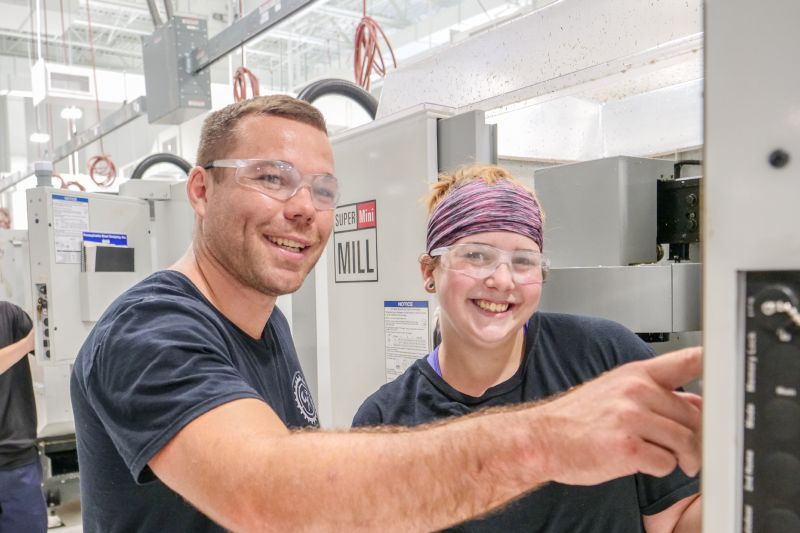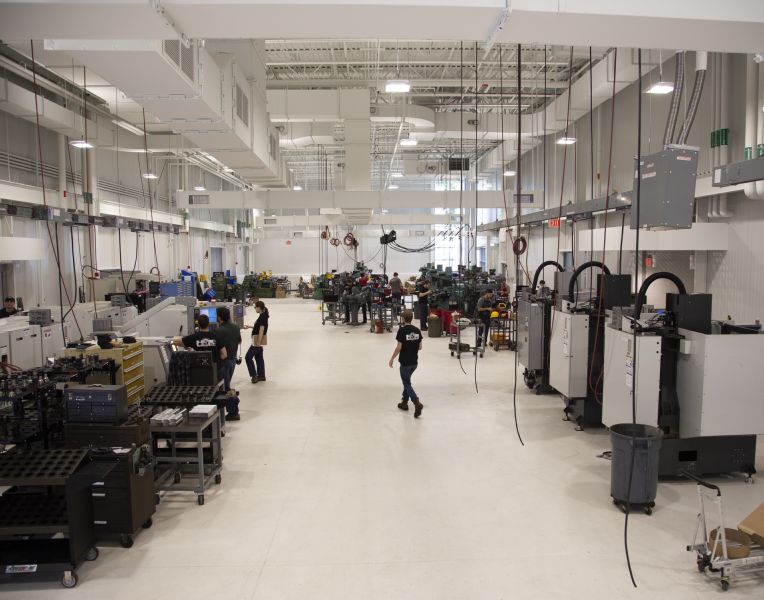 The Skilled Women Get STEM Jobs: Recruiting and Engaging Female Students project is based at Thaddeus Stevens College of Technology. Thaddeus Stevens College is a residential, two-year, technical college located in Lancaster, Pennsylvania. The college offers 22 technical programs that include associate degrees, certificate programs, and short-term programs.
The Skilled Women Get STEM Jobs: Recruiting and Engaging Female Students project is based at Thaddeus Stevens College of Technology. Thaddeus Stevens College is a residential, two-year, technical college located in Lancaster, Pennsylvania. The college offers 22 technical programs that include associate degrees, certificate programs, and short-term programs.

Students enrolled in the Computer Integrated Machining Program are given the opportunity to program and operate modern automated equipment.
The National Science Foundation's Advanced Technological Education (ATE) program has been funding innovation at two-year colleges for over twenty years. With a focus on the education of technicians for the high-technology fields that drive our nation's economy, and strong partnerships between academic institutions and industry, ATE promotes improvement in the education of science and engineering technicians at the undergraduate and secondary school levels.
To learn more about ATE, please visit the NSF ATE program home page.

Skilled Women Get STEM Jobs focuses on increasing female enrollment in the computer integrated machining, electrical technology, and water and environmental technology programs. It is accomplishing this goal through partnerships with high schools and industry to increase awareness of STEM technical careers.
Since 2015 more than 350 young women have met female technicians during industry tours. As a result of seeing role models' work environments and other gender-diversity outreach initiatives, more females are participating in the targeted programs.
Recruitment for the computer integrated machining program has been particularly successful with female enrollment reaching a new high of 12% in fall 2019 when four women were enrolled.
This project at Thaddeus Stevens College of Technology entitled Skilled Women Get STEM Jobs is designed to enable female students to prepare for careers in high demand, typically male-dominated science, technology, engineering, and mathematics (STEM) fields. This project will contribute to the body of evidence about effective ways for high schools, community colleges, and industries to develop STEM pipelines that encourage young women to enter typically male-dominated technical careers. The project will have an impact not only on the large area served by the college, but also nationally, by disseminating information about successful recruiting and retention activities to encourage similar initiatives at other colleges and in industry groups.
(a) Machine Tool & Computer Aided Manufacturing that educates technicians for jobs as machinists, tool and die makers, and computer numerically controlled operators and programmers,
(b) Electrical Technology that educates technicians for the construction industry as electricians, the manufacturing industry as industrial electricians, and the utility industry as power generation and distribution technicians, and
(c) Water & Environmental Technology Program that educates technicians for water and wastewater treatment at municipal and private facilities, and for food processing, paper production, waste-to-energy, and environmental companies.
(a) encourage female high school students to enroll in college programs that offer solid job prospects,
(b) engage the enrolled students through an informal group mentoring program and internship opportunities, and
(c) facilitate their entry into the workforce by ensuring their familiarity with industries and job opportunities.
Recruitment activities target females at 11 high schools through industry tours, college tours, and hands on cross disciplinary immersion workshops that develop a product designed by the participants to solve a local environmental problem. The project will test a novel approach to see if contact with female technicians, industry tours, and hands-on cross-disciplinary workshops are promising practices for attracting female high school students into three targeted STEM fields. It will also develop and test a replicable model for such workshops and a comprehensive evaluation will help determine the most effective strategies. Within three years, female enrollment will increase from 6% college-wide to 20% in the three targeted programs, and female students in those programs will be retained at the same high rate as males.